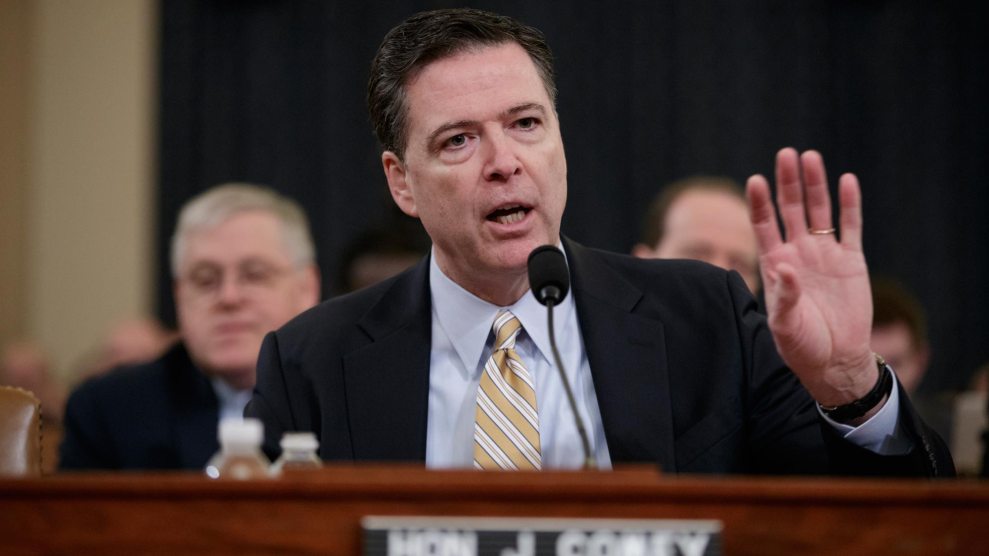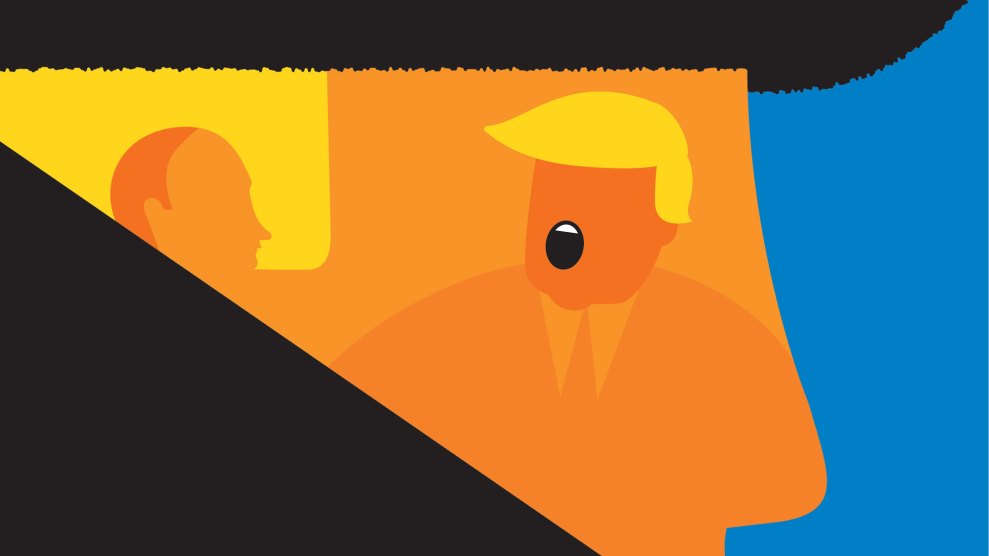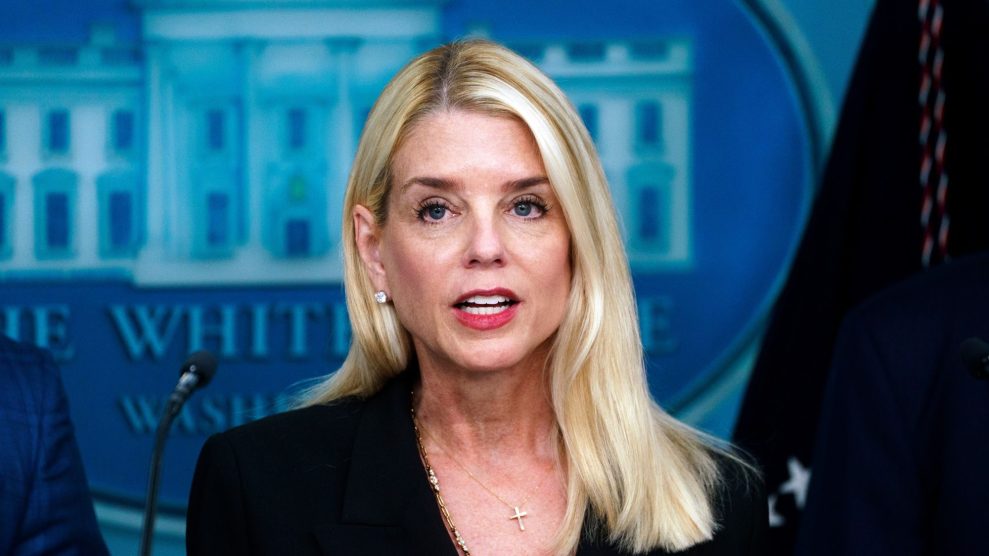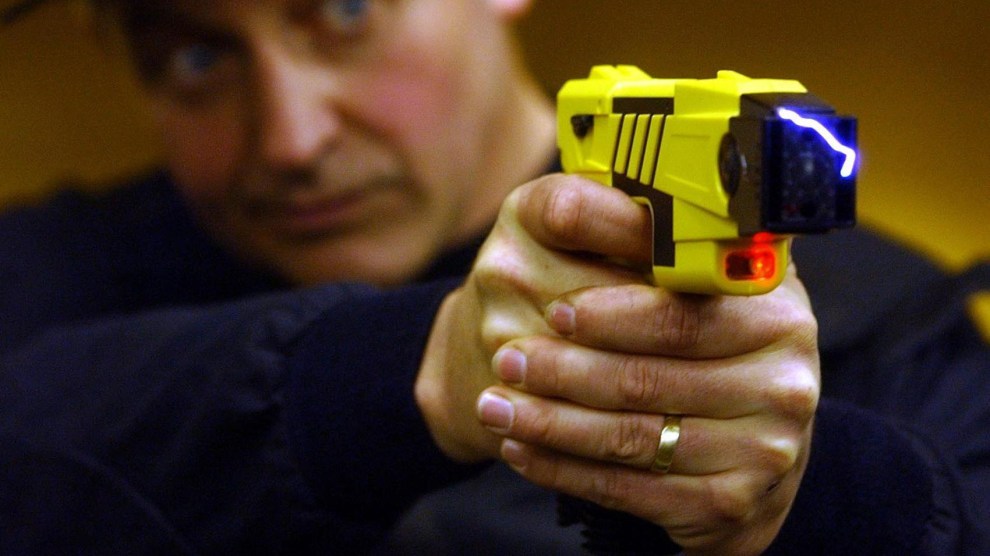
J. Scott Applewhite/AP
As details continue to emerge about President Trump’s extraordinary firing of FBI Director James Comey, there are growing indications that the FBI’s investigation of Trump campaign ties to Russia was a key motive in the termination. Here’s a play by play of the controversy:
2016
July 5: Comey announces that the FBI did not find evidence to support criminal charges against Hillary Clinton for her use of a private email server as Secretary of State. Comey also concludes that Clinton and her staff were “extremely careless” in their handling of classified information.
July 7: Comey testifies before the House Oversight Committee, reaffirming his decision not to charge Clinton.
Late July: The FBI launches a counterintelligence investigation into contacts between Trump associates and Russia. There is no public confirmation of this investigation at the time, but Comey later confirms it in a March 2017 hearing before the House Intelligence Committee.
August 16: The FBI defends its decision not to recommend charges against Hillary Clinton in a letter to House Oversight Committee members.
September 28: Testifying before the House Judiciary Committee, Comey says that reopening the Clinton email investigation is not necessary.
October 28: Comey sends a letter to members of Congress saying that the FBI would be re-opening its investigation into Clinton’s emails, following the discovery of new emails on the laptop of former congressman Anthony Weiner, which was seized as part of a criminal investigation into Weiner. The laptop was also used by Weiner’s then-wife, top Clinton aide Huma Abedin; some of the newly-discovered emails included messages between Abedin and Clinton.
October 31: At a campaign rally, Trump praises Comey’s handling of the Clinton investigation: “It took guts for Director Comey to make the move that he made, in light of the kind of opposition he had, where they’re trying to protect her from criminal prosecution,” Trump said. “What he did was the right thing.”
So Trump fired Comey, citing his handling of the Clinton case.
This was Trump on Comey in October, after the Clinton letter. Watch. pic.twitter.com/CjPLsxshlH
— Bradd Jaffy (@BraddJaffy) May 10, 2017
2017
January 10: Comey testifies at a Senate Intelligence Committee hearing; he declines to say whether the FBI is investigating Trump campaign ties to Russia.
January 15: Incoming White House chief of staff Reince Priebus says the president-elect has no plans to remove the FBI chief. “Yes, he has confidence in Director Comey,” Priebus says. “We have had a great relationship with him over the last several weeks. He’s extremely competent.”
January 18: During a weekly conference call with senior employees, Comey conveys that the president-elect will not be asking him to leave his post.
January 22: At a White House event two days after his inauguration, Trump introduces Comey: “Oh there’s Jim, he’s become more famous than me.”
February 17: Comey meets with members of the Senate Intelligence Committee, which sends letters to more than a dozen agencies, groups, and individuals asking them to preserve all communications related to the investigation of Russian interference in the 2016 election.
March 2: After revelations the previous day that Sen. Jeff Sessions during his confirmation hearings did not disclose his two conversations with Russian Ambassador Sergey Kislyak, Sessions announces: “I have now decided to recuse myself from any existing or future investigations of any matter relating in any way to the campaigns for president of the United States.”
March 4: Without providing any proof, Trump alleges that President Obama had him under surveillance during the election.
Terrible! Just found out that Obama had my “wires tapped” in Trump Tower just before the victory. Nothing found. This is McCarthyism!
— Donald J. Trump (@realDonaldTrump) March 4, 2017
March 20: The House Intelligence Committee holds its first public hearing on its Russia investigation. Comey testifies that the FBI has since July been “investigating the nature of any links between individuals associated with the Trump campaign and the Russian government, and whether there was any coordination between the campaign and Russia’s efforts.” Comey also dismisses Trump’s surveillance claim: “With respect to the president’s tweets about alleged wiretapping directed at him by the prior administration, I have no information that supports those tweets and we have looked carefully inside the FBI.”
April 12: Fox Business’s Maria Bartiromo asks Trump: “Was it a mistake not to ask Jim Comey to step down from the FBI at the outset of your presidency? Is it too late now to ask him to step down?” Trump responds: “No, it’s not too late, but, you know, I have confidence in him. We’ll see what happens. You know, it’s going to be interesting.”
Last month, President Trump told @MariaBartiromo on Fox Business that he had confidence in Comey pic.twitter.com/OW8zfS7lmZ
— Alex Hooper (@alex__hooper) May 10, 2017
May 2: Trump tweets that Comey is “the best thing that ever happened to Hillary Clinton” and declares the Russia story the Democrats’ excuse for losing the election:
FBI Director Comey was the best thing that ever happened to Hillary Clinton in that he gave her a free pass for many bad deeds! The phony…
— Donald J. Trump (@realDonaldTrump) May 3, 2017
…Trump/Russia story was an excuse used by the Democrats as justification for losing the election. Perhaps Trump just ran a great campaign?
— Donald J. Trump (@realDonaldTrump) May 3, 2017
May 3: Comey testifies before the Senate Judiciary Committee about his decision in October to re-open the Clinton email investigation. “It makes me mildly nauseous to think that we may have had some impact on the election,” Comey says, but justifies his decision based on Abedin’s “regular practice” of forwarding “hundreds of thousands of emails, some of which contain classified information.”
May 8: ProPublica reports that Comey’s latest remarks about Abedin’s forwarding of emails was greatly exaggerated.
May 9: The FBI sends a letter to the Senate Judiciary Committee to correct the record on Comey’s testimony. The agency notes that most of the relevant Abedin emails on the laptop were via device back-ups—only “a small number” came from manual forwarding. Few contained classified information, and none were new to the investigation.
– While Comey is conducting FBI business in Los Angeles, Trump fires him via letter. Trump cites the counsel of Attorney General Jeff Sessions and Deputy Attorney General Rod Rosenstein, whose memo to Trump focuses heavily on Comey’s handling of the Clinton email probe. (Read Trump’s letter firing Comey, and Sessions’ and Rosenstein’s memos, below.)
–CNN reports that the US attorney’s office in Alexandria, Virginia has issued grand jury subpoenas to associates of former Trump national security adviser Michael Flynn.
-Within hours of Comey’s firing, more than 100 lawmakers, including a few Republicans, call for an independent investigator or special prosecutor to take over the FBI’s Russia investigation.
May 10: Trump takes to Twitter to defend his firing of James Comey amid an intense backlash. “Comey lost the confidence of almost everyone in Washington, Republican and Democrat alike. When things calm down, they will be thanking me!” he writes.
The Democrats have said some of the worst things about James Comey, including the fact that he should be fired, but now they play so sad!
— Donald J. Trump (@realDonaldTrump) May 10, 2017
James Comey will be replaced by someone who will do a far better job, bringing back the spirit and prestige of the FBI.
— Donald J. Trump (@realDonaldTrump) May 10, 2017
Comey lost the confidence of almost everyone in Washington, Republican and Democrat alike. When things calm down, they will be thanking me!
— Donald J. Trump (@realDonaldTrump) May 10, 2017
-CNN reports that a source claims that Trump confidant Roger Stone urged Trump to fire Comey. Within minutes, Trump responds to the report on Twitter, calling out CNN and saying the report is “fake news.”
The Roger Stone report on @CNN is false – Fake News. Have not spoken to Roger in a long time – had nothing to do with my decision.
— Donald J. Trump (@realDonaldTrump) May 10, 2017
Stone says on Twitter that he “never made such a claim” but supports Trump’s decision “100%.”
-Russian Foreign Minister Sergey Lavrov arrives in Washington for meetings with Secretary of State Rex Tillerson and Trump. At a press conference with Tillerson, a reporter asks about the Comey firing. Lavrov mocks the questions and feigns ignorance of the news before walking away.
Here’s video of Lavrov-Tillerson—>
Q: “Does Comey cast a shadow over your talks?”
Lavrov: “Was he fired? You are kidding, you are kidding” pic.twitter.com/8yJb2DkZnd
— Tom Namako (@TomNamako) May 10, 2017
-At the Capitol, GOP Senate Majority Leader Mitch McConnell rejects calls for a special prosecutor to take over the Russia probe: “Today we’ll no doubt hear calls for a new investigation, which could only serve to impede the current work being done.”
-In a brief exchange with a CBS News reporter at a hockey game in Sochi, Russia, President Vladimir Putin says that Comey’s firing “will have no effect” on US-Russia relations. “Your question looks very funny for me, don’t be angry with me,” Putin scoffs. “We have nothing to do with that. President Trump is acting in accordance with his competence, and in accordance with his law and constitution…You see, I’m going to play hockey with hockey fans.”
Our @elizapalmer caught Russian Pres. Putin rink side and asked him about the firing of former. Dir. Comey. pic.twitter.com/3nytJYi0si
— CBS Evening News (@CBSEveningNews) May 10, 2017
-The New York Times reports that just days prior to his dismissal, Comey asked—in a meeting with Deputy AG Rosenstein—for additional resources for the FBI’s Russia investigation.
-CNN reports that a source close to Comey says Comey was fired for two reasons: 1) Never providing the president with assurances of personal loyalty, and 2) The acceleration of the FBI’s Russia investigation.
May 11: Acting FBI Director Andrew McCabe testifies in a Senate hearing that the White House has misled the public about the FBI’s Russia investigation and regard for Comey at the agency. He says the Russia probe is “highly significant” and that “Comey enjoyed broad support within the FBI and still does to this day.”
-The New York Times and CNN each report via sources close to James Comey that part of President Trump’s motivation for firing Comey was the FBI director’s refusal to swear political loyalty to the president. The Times details a conversation between Trump and Comey during a one-on-one dinner that took place at the White House on January 27—just one day after former acting Attorney General Sally Yates warned the Trump White House that then National Security Adviser Michael Flynn was vulnerable to blackmail by the Kremlin. Three days before the dinner, on Jan. 24, Flynn had been interviewed by the FBI about his contacts with the Russian ambassador. In the conversation with Yates the day before the Comey dinner, White House Counsel Don McGahn asked Yates for information on Flynn’s FBI interview, and Yates declined to answer.
-Trump says in an NBC interview that he asked Comey three times whether he is personally under investigation by the FBI for possible Russia ties—twice on the phone, and once at the January 27 dinner. Trump claims that Comey reassured him that he is not under investigation. (Sources close to Comey say this never happened.)
May 16: The New York Times reports that during an Oval Office meeting in February, Donald Trump asked then FBI director James Comey to drop the agency’s investigation into Michael Flynn, who had resigned the day before amid controversy over his discussions of US sanctions with the Russian ambassador. “I hope you can see your way clear to letting this go, to letting Flynn go,” Trump said to Comey, according to a two-page memo Comey drafted after the meeting. “He is a good guy. I hope you can let this go.” The Washington Post and Politico subsequently confirmed the Times’ account. According to the paper, Comey kept detailed records of all of his conversations with the president.
-The Washington Post reports that Comey shared his memos with a small number of people at the Justice Department. (It’s unclear whether those officials include Rod Rosenstein or Jeff Sessions, who were involved in Comey’s firing.)
May 17: Eleven Democratic senators send a letter to the Justice Department Inspector General asking him to investigate whether Attorney General Jeff Sessions violated his pledge to recuse himself from any investigations connected to the 2016 election when he took part in the firing of FBI Director James Comey.
-Deputy Attorney General Rod Rosenstein appoints former FBI director Robert Mueller to serve as a special counsel to investigate Russian interference in the 2016 election.
May 19: The New York Times reports that in Trump’s May 10 Oval Office meeting with Russian foreign minister Sergey Lavrov and Russian ambassador Sergey Kislyak, Trump called former FBI director Comey a “nut job” and expressed relief at his ouster. “I just fired the head of the F.B.I. He was crazy, a real nut job,” Trump said, according to a document summarizing the meeting, which an American official read to The New York Times. “I faced great pressure because of Russia. That’s taken off.”
May 25: The Washington Post reports that Jared Kushner has been identified as a focus of the FBI’s investigation into Russia and the Trump campaign, according to people familiar with the investigation. This makes Kushner—who was reported to have strongly advocated Comey’s firing—the first White House official revealed to be central in the FBI’s probe.
June 2: Bloomberg News reports that the Trump White House is reviewing whether to invoke executive privilege to prevent Comey from testifying publicly before the Senate Intelligence Committee, scheduled for June 8.
June 6: The Washington Post reports that on March 22, Trump asked Director of National Intelligence Daniel Coats and CIA director Mike Pompeo whether he could ask then-FBI director James Comey for the bureau “to back off its focus” on Michael Flynn. Coats reportedly discussed the meeting with some of his associates, deciding that this sort of intervention would not be appropriate. “The events involving Coats show the president went further than just asking intelligence officials to deny publicly the existence of any evidence showing collusion during the 2016 election,” the Post reports. “The interaction with Coats indicates that Trump aimed to enlist top officials to have Comey curtail the bureau’s probe.”
– The New York Times reports that the day after a February Oval Office meeting in which Trump asked James Comey to drop the bureau’s investigation of Michael Flynn, Comey asked Attorney General Jeff Sessions to ensure that Comey was never left alone with the president. According to several law enforcement officials, Comey did not reveal what was said during his meeting with the Trump but told Sessions it was inappropriate for the FBI director to speak privately with the president.
June 7: Testifying before the Senate intelligence committee, Director of National Intelligence Dan Coats and National Security Agency Director Mike Rogers refuse to answer questions about whether Donald Trump had asked them to intervene in the FBI’s Russia investigation.
– The Senate Intelligence Committee releases the opening statement James Comey will deliver on June 8 at a hearing before the committee. The statement confirms that Trump asked then FBI-director Comey to drop the investigation of Michael Flynn that has become a focus of the FBI’s Russia probe. Read the whole statement below:

















